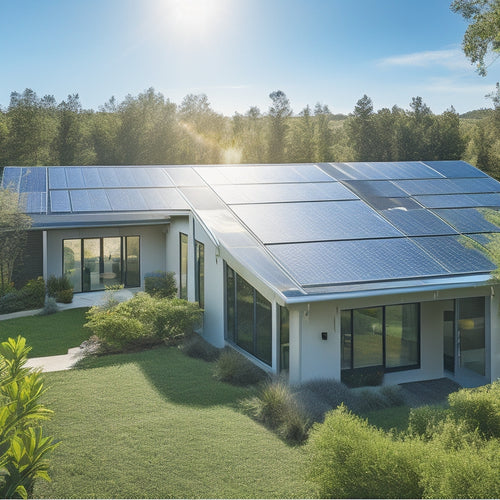
Cleaning and Maintenance Costs for Home Systems
Share
You'll spend around 1% to 3% of your home's value annually on cleaning and maintenance costs for various home systems. Regular checks and tune-ups are essential to minimize repair frequency and extend system lifespan. Routine inspections can identify potential issues before they escalate, saving you time and money in the long run. By prioritizing proactive maintenance, you can reduce energy consumption, prevent sudden system failures, and optimize system performance. As you consider these factors, you'll want to investigate specific strategies for optimizing your home's unique systems and maximize your maintenance budget.
At a Glance
- Regular system checks and tune-ups can reduce cleaning and maintenance costs by identifying and addressing minor issues before they escalate.
- Proactive maintenance can extend the lifespan of home systems, reducing the need for frequent replacements and associated costs.
- Energy-efficient appliances and systems can lower utility bills and promote sustainability, leading to long-term cost savings.
- Air filter replacement schedules and selecting the right filter type are crucial for maintaining optimal HVAC performance and indoor air quality.
- Larger and more complex home systems require more frequent and specialized maintenance, increasing cleaning and maintenance costs.
Reduced Repair Frequency Matters
You can greatly reduce the frequency of costly repairs by incorporating regular system checks into your maintenance routine.
These checks allow you to identify potential issues before they escalate into major problems, saving you time and money in the long run.
By being proactive, you'll be able to address minor problems early on, preventing them from causing extensive damage to your home systems.
With a reliable solar energy storage system like battery storage systems in place, you can also reduce your reliance on the grid and minimize the risk of power outages that can lead to system failures.
Regular System Checks
Regular system checks are essential to reducing repair frequency and the associated costs. By performing routine system diagnostics, you can identify potential issues before they become major problems, saving you time and money in the long run. This proactive approach allows you to schedule maintenance at your convenience, rather than waiting for a system failure to occur.
To make the most of regular system checks, consider the following schedule:
| System | Check Frequency | Tasks to Perform |
|---|---|---|
| HVAC | Quarterly | Inspect air filters, check thermostat settings, and verify proper airflow |
| Plumbing | Semiannually | Inspect water meter, check for leaks, and test water pressure |
| Electrical | Annually | Inspect circuit breakers, check for flickering lights, and test GFCI outlets |
Proactive Issue Identification
By taking a proactive approach to issue identification, homeowners can greatly reduce the frequency of repairs, thereby saving time and money. This is achieved through regular, proactive inspections of your home's systems, allowing for early detection of potential issues before they become major problems.
By identifying and addressing minor issues promptly, you can prevent them from escalating into costly repairs or even system failures. For instance, a well-maintained home battery storage system can guarantee a seamless and efficient experience, allowing you to maximize your solar panel investment and reduce reliance on the grid.
Additionally, proactive inspections can help identify energy efficiency opportunities, leading to a more sustainable living experience. Proactive inspections enable you to stay on top of maintenance, assuring that your systems operate efficiently and effectively.
This approach also helps you avoid unexpected downtime, which can be inconvenient and costly. By detecting issues early, you can address them before they cause significant damage, saving you money and hassle in the long run.
Extended System Lifespan
When you regularly tune up your home systems, you're not only reducing repair frequency, but you're also extending their lifespan.
By staying on top of maintenance, you prevent minor issues from escalating into major problems that can lead to premature system failure.
In fact, well-maintained solar power systems, such as photovoltaic systems, can operate at peak levels for 25 years or more.
Regular Tune-Ups Matter
Within the complex network of home systems, individual components interact and rely on one another to maintain a comfortable and safe living environment. As you traverse the intricate web of systems, it's vital to prioritize regular tune-ups to guarantee peak performance and extend the lifespan of each component.
Regular tune-ups offer significant benefits, including improved efficiency, reduced energy consumption, and enhanced overall system performance. By scheduling routine maintenance, you can identify and address minor issues before they escalate into costly repairs. This proactive approach translates to substantial maintenance savings, allowing you to allocate resources more effectively.
Tune-ups also help prevent premature wear and tear, reducing the likelihood of sudden system failures. By extending the lifespan of your home systems, you'll enjoy a reduced need for frequent replacements, resulting in significant long-term cost savings.
Prevention Is Key
Your home's systems, much like a finely tuned orchestra, rely on each individual component to work in harmony. To guarantee they continue to perform at their best, you must take preventive measures to extend their lifespan. By doing so, you'll reap cost savings and avoid costly repairs down the line.
| System | Routine Inspections | Maintenance Schedules |
|---|---|---|
| HVAC | Check air filters monthly | Schedule annual tune-ups |
| Plumbing | Inspect water heaters bi-annually | Replace worn-out washers quarterly |
| Electrical | Check circuit breakers monthly | Upgrade outdated wiring annually |
| Roofing | Inspect for damaged shingles bi-annually | Clean gutters quarterly |
| Insulation | Check for gaps and cracks annually | Add insulation as needed |
As a homeowner, it's your responsibility to prioritize routine inspections and maintenance schedules. By doing so, you'll guarantee system efficiency, reduce energy consumption, and make a long-term investment in your home. Timely interventions will also prevent minor issues from becoming major problems, saving you time and money in the process.
Air Filter Replacement Schedules
You'll need to determine the ideal filter change frequency to guarantee your home's air quality and HVAC system performance.
The type of filter you use is also vital, as it affects the system's efficiency and your indoor air quality.
With the increasing adoption of renewable energy systems, such as solar battery systems, it's important to evaluate the impact of air quality on the overall performance of your home's energy storage solutions.
Filter Change Frequency
Replacing air filters regularly is crucial to maintain ideal indoor air quality and extend the lifespan of your heating, ventilation, and air conditioning (HVAC) system.
You'll want to determine the ideal filter change frequency for your home to avoid compromising your indoor air quality and HVAC system performance.
The filter lifespan varies depending on several factors, including the type of filter, usage, and environmental conditions. Typically, basic filters need to be replaced every 1-3 months, while high-efficiency filters can last 6-12 months.
Failure to replace filters regularly can lead to a significant maintenance impact, including reduced airflow, increased energy consumption, and even HVAC system failure.
When deciding on a filter change frequency, consider the manufacturer's recommendations, your home's specific conditions, and your personal preferences.
You may need to replace filters more frequently if you have pets, allergies, or live in an area with high levels of air pollution.
Filter Type Importance
Air filter replacement schedules vary depending on the type of filter used, and understanding the characteristics of different filters is essential for creating an effective maintenance plan.
You'll need to take into account factors like filter selection, filtration efficiency, and airflow resistance when choosing the right filter for your home.
There are three primary types of air filters: mechanical, electronic, and hybrid.
Mechanical filters, like fiberglass and pleated filters, capture particles through physical obstruction.
Electronic filters, such as HEPA and electrostatic filters, use electrostatic charges to attract and trap particles.
Hybrid filters combine mechanical and electronic filtration methods.
Each type has its own strengths and weaknesses, and your filter selection will depend on your specific needs and preferences.
When selecting a filter, evaluate the MERV rating, which measures filtration efficiency.
A higher MERV rating indicates better filtration, but also increased airflow resistance, which can increase energy costs.
System Size Matters Most
When you're calculating cleaning and maintenance costs for your home systems, you'll find that system size is a critical factor. The larger your home's square footage, the more extensive your systems will be, and the higher your costs will rise.
For instance, a residential solar energy storage system with battery storage will require more maintenance than a smaller system, especially if it includes advanced features like grid tie inverters and electric vehicle charging stations.
Additionally, the complexity of your systems will also impact your costs, with more intricate systems requiring more frequent and specialized maintenance.
Square Footage Impacts Cost
As you consider the cleaning and maintenance costs for your home systems, it's vital to recognize that system size plays a significant role in determining expenses. The larger your system, the more it'll cost to clean and maintain. This is especially true when it comes to HVAC systems, where square footage costs can add up quickly.
For instance, a 2,000-square-foot home will require more ductwork and vents than a 1,000-square-foot home, resulting in higher maintenance costs.
When budgeting for maintenance, it's important to factor in the size of your system. A larger system will require more frequent filter replacements, coil cleanings, and other maintenance tasks, which can increase your overall expenses.
System Complexity Affects Price
Often, homeowners overlook the impact of system complexity on maintenance costs, but it's an essential factor to take into account.
You see, a system's design, installation quality, and technology integration all play an important role in determining its maintenance costs. For instance, a complex system with multiple components and advanced features will naturally require more frequent and specialized maintenance, driving up costs.
Your user habits also come into play, as improper usage can lead to premature wear and tear, reducing the system's lifespan and increasing maintenance needs.
Material durability, warranty coverage, and manufacturer support are also critical considerations, as they can greatly impact the frequency and cost of repairs.
Additionally, energy efficiency and seasonal adjustments can affect your system's performance and maintenance requirements.
Lower Energy Consumption Rate
You can considerably reduce your energy consumption rate by upgrading to energy-efficient appliances, which won't only lower your utility bills but also contribute to a more sustainable future.
When selecting new appliances, look for the ENERGY STAR label, which indicates that the product meets energy efficiency standards set by the U.S. Environmental Protection Agency.
Efficient Appliance Upgrades
By incorporating efficient appliance upgrades into your home maintenance routine, you can considerably lower your energy consumption rate. This not only helps reduce your environmental footprint but also saves you money on utility bills. When it's time to replace an appliance, consider energy efficient choices that align with your lifestyle and budget.
| Appliance | Energy Efficiency Features |
|---|---|
| Refrigerator | Energy Star certification, high-efficiency compressor, and advanced insulation |
| Dishwasher | Sensor-activated washing, low-water consumption, and Energy Star certification |
| Clothes Washer | High-efficiency motor, advanced water management, and Energy Star certification |
| Air Conditioner | Inverter technology, high-efficiency compressor, and smart sensors |
Frequently Asked Questions
How Often Should I Clean My HVAC System's Condenser Coils?
You should clean your HVAC system's condenser coils every 2-3 months, depending on usage and outdoor conditions, to maintain efficiency and airflow, as regular cleaning frequency guarantees peak performance, reduces energy bills, and prolongs system lifespan.
Can I DIY Cleaning and Maintenance Tasks to Save Money?
Embracing your inner handyman, you can indeed DIY cleaning and maintenance tasks to save a pretty penny. By leveraging DIY cleaning benefits, you'll need essential maintenance tools like soft brushes and gentle cleaners to get the job done efficiently.
What Maintenance Tasks Can I Skip to Reduce Overall Costs?
You can skip non-essential maintenance tasks, like polishing fixtures, to reduce overall costs, but prioritize essential tasks, like filter replacements, to avoid system failures; follow cost-saving tips, such as grouping tasks and scheduling routine checks to optimize your maintenance budget.
Are There Any Cleaning Products Not Recommended for Home Systems?
When choosing cleaning products, you'll want to avoid ones containing harmful chemicals that can damage home systems. Opt for safe cleaning solutions that are specifically designed for the task at hand, ensuring you're not compromising your system's integrity or your own freedom.
How Do I Know When to Replace My HVAC System Entirely?
When your HVAC system is on life support, don't procrastinate - it's time to contemplate replacement. Look for HVAC lifespan indicators like frequent repairs, increased energy bills, and uneven heating/cooling. Weigh replacement cost factors, such as system age, efficiency, and your budget, to break free from the repair cycle.
Explore More
By adopting a proactive approach to cleaning and maintenance, you'll reduce the frequency of costly repairs and extend the lifespan of your home systems. Think of it like regular oil changes for your car - it's a small investment upfront that saves you from a blown engine down the road. In fact, the US Department of Energy estimates that regular maintenance can save homeowners up to 30% on their energy bills. By staying on top of cleaning and maintenance, you'll be driving smoothly towards a more cost-effective and energy-efficient home.
Related Posts
-

Why Outdoor Solar Lighting Systems Are Sustainable
Outdoor solar lighting systems are sustainable because they utilize renewable energy, drastically reducing your carbo...
-

Smart Grid Technology Implementation Challenges
You'll encounter several challenges when implementing smart grid technology, particularly in cost management, scalabi...
-

Installing Metal Solar Roofs for Maximum Energy Efficiency
Installing metal solar roofs can drastically enhance your home's energy efficiency and durability. These roofs withst...


